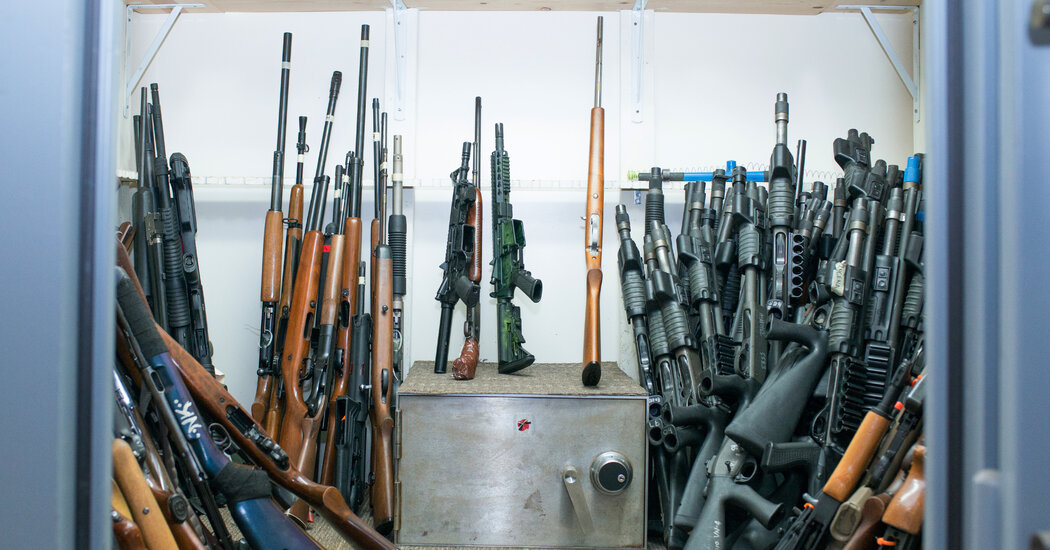Communities across the U.S. are fueling a secondary arms market by giving seized and surrendered guns to disposal services that destroy one part and resell the rest.
When Flint, Mich., announced in September that 68 assault weapons collected in a gun buyback would be incinerated, the city cited its policy of never reselling firearms.
“Gun violence continues to cause enormous grief and trauma,” said Mayor Sheldon Neeley. “I will not allow our city government to profit from our community’s pain by reselling weapons that can be turned against Flint residents.”
But Flint’s guns were not going to be melted down. Instead, they made their way to a private company that has collected millions of dollars taking firearms from police agencies, destroying a single piece of each weapon stamped with the serial number and selling the rest as nearly complete gun kits. Buyers online can easily replace what’s missing and reconstitute the weapon.
Hundreds of towns and cities have turned to a growing industry that offers to destroy guns used in crimes, surrendered in buybacks or replaced by police force upgrades. But these communities are in fact fueling a secondary arms market, where weapons slated for destruction are recycled into civilian hands, often with no background check required, according to interviews and a review of gun disposal contracts, patent records and online listings for firearms parts.



A “gun” is legally defined. There are dozens of parts, but usually only 1-2 are deemed to be the “firearm” for legal purposes, and those get the serial number. The rest, even when necessary for proper operation of the weapon, are essentially just accessories as far as the law is concerned.
Sounds like a useful loophole for gun reform and getting around the 2nd amendment.
It’s a practical line that has to be drawn. Otherwise your going to have to go for a background check for every pin screw and spring you want to buy.
Some countries use the barrel as the S/N part instead of the receiver but I’d rather a wear item not be the s/n item. Plus, with AR15 you can buy one receiver and then gets finished uppers in 5.56mm, 9mm, .50 Beowulf, .300 Blackout etc.
Or have both, and a replacement barrel needs to be stamped with a serial number as well
That’s kind of what California has in place for semi auto rifles. If the gun has certain ‘assault features’ like a collapsible stock, pistol grip, muzzle device, etc - the firearm needs to be taken apart to remove the magazine.
If the firearm has no assault features, then you can have a standard removable magazine (capped at 10 rounds). As a result you’ll see some pretty odd looking CA compliant rifles sold in state that are featureless.
For an AR-15 you can just use an AR Maglock and Kingpin, then it’s just a button press to very slightly separate the upper and lower receiver, allowing for magazine ejection. It’s almost as fast to change magazines as in other states.
There’s also zero chance a criminal would follow these laws. It takes maybe a minute to disable a maglock and swap on whatever stock you want. “Freedom Week” or old 30 round mags are prevalent as well.
it’s why the “high end airsoft” market is so big in Japan. they’re basically just the externals of a gun, then they buy rest piecemeal.
Spoken with such confidence, but no facts
Japan arguably has the most stringent weapons laws in the world, and while the high end airsoft is a big deal there, there isn’t a black/gray market for rebuilding like you’re implying. If you like guns in Japan, you join the JSDF, emigrate, or buy airsoft.
https://en.m.wikipedia.org/wiki/Firearm_and_Sword_Possession_Control_Law
Isn’t airsoft dangerous enough without much modification? Maybe not lethal but I know several people who wanted to buy that for self-defence where it’s hard to obtain a firearm.
Airsoft for self-defense?
That is the worst idea I have ever heard.
Literally all you’re going to do is piss them off. Unless you have a rediculously high powered one and put it right through somebodys eye you ARE NOT incapacitating someone with airsoft.
Ok, I see, thanks for an explanation
idiots
Self-defense? In Japan? Lol
No, I was not referring to Japan